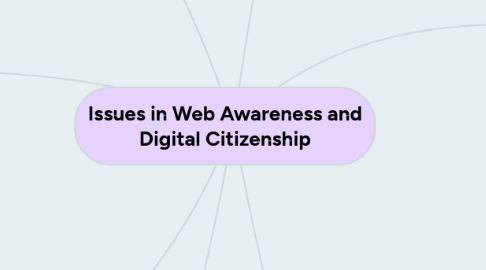
1. Copyright
1.1. Copy & Paste
1.2. Intellectual Rights
1.3. Laws
1.3.1. Intellectual Property
1.3.2. Copyright
1.3.3. Public Domain
1.3.4. Trademark
1.3.5. Genericized Trademark
1.3.6. Fair dealing
1.3.7. Fair Use
1.3.8. Technological Protection Mechanisms
1.4. Violation
1.4.1. Consquences
2. Marketing
2.1. Fun and Engaging
2.2. Relationship Building
2.3. Viral Ads
2.4. Behavioural Targeting
2.5. Games
2.6. Brand PGS
3. Authenticity
3.1. Information
3.1.1. Unlimited
3.1.2. Unknown Sources
3.1.3. Evaluate Information
3.1.3.1. Authority
3.1.3.2. Coverage
3.1.3.3. Objectivity
3.1.3.4. Accuracy
3.1.3.5. Currency
3.2. Fact or Folly
3.2.1. "Not everything on the internet is true"
3.3. E-mail Vaidity
3.3.1. How do you know?
4. Privacy
4.1. "Your entire life is online..."
4.1.1. Social Networking
4.1.2. Geotagging
4.1.3. Posting Pictures
4.2. Personal Publishing
4.2.1. Audience
4.2.2. Anonymity
4.2.3. Permanence
4.2.4. Copyright
4.2.5. Free Speech
5. Web Awareness
5.1. Internet Safety
5.1.1. Parent Supervision
5.1.2. Awareness
5.1.3. Sexually Implicit Material
5.1.3.1. Negative Impact
5.1.4. Cyberbullying
5.2. Internet as a Threat
5.2.1. Unhealthy Sites
5.2.2. Personal Info
5.2.3. Platform to sell commercial products
5.2.4. What info is true?
5.2.5. Violation of Intellectual Property
6. Digital Citizenship
6.1. 9 Elements
6.1.1. Access
6.1.2. Commerce
6.1.3. Communication
6.1.4. Literacy
6.1.5. Etiquette
6.1.6. Law
6.1.7. Rights and Responsibility
6.1.8. Health & Wellness
6.1.9. Security
6.2. Media Literacy
6.2.1. THINK BEFORE YOU CLICK
6.2.2. Ethical Thinking
6.2.2.1. Identity
6.2.2.2. Privacy
6.2.2.3. Ownership
6.2.2.4. Trustworthiness
6.2.2.5. Participation
6.2.3. Use, Understand, Create
6.2.4. How you portray yourself online.
6.3. RESPECT
6.3.1. Yourself
6.3.2. Intellectual Property
6.3.3. Others
6.4. Netiquette
6.4.1. "Digital Etiquette"
6.4.1.1. Unspoken Rules
6.4.1.2. Rules for how to behave online
6.4.2. Anonymity
6.4.2.1. Flaming
6.4.3. Clear communication
6.4.3.1. E-mails and IM's
6.4.3.2. Use of Abbreviations, Emoticons, Emojis
6.4.3.3. Capital letters
6.4.3.4. Use of Humour
6.4.3.5. Re-read your message
6.4.4. Privacy
6.4.4.1. Always ASK
6.4.4.1.1. Personal Pictures
6.4.4.1.2. Social Networking
6.4.4.2. Think before you post
7. Teachers
7.1. Strategies
7.1.1. Gaming
7.1.2. Analogies and Student Generated Projects
7.1.3. Investigative Role-Playing
7.1.4. Guest Speakers
7.1.5. Students as the Teacher
7.1.6. Third Party Resources
7.1.7. Self Created Curriculum
7.1.8. Department of Citizenship Program
7.1.9. Research Lesson
7.1.10. School-wide Program
7.2. Model proper behviour
7.2.1. Citing information
7.2.2. Start Conversations
7.2.2.1. Consequences of poor internet use
7.3. Resources
7.3.1. Educational Games
7.3.1.1. Conversation starters
7.3.2. Using the Internet Wisely
7.3.3. Young Canadians in a Wired World
7.3.4. Cyberbullying
7.3.5. Teacher Liability
